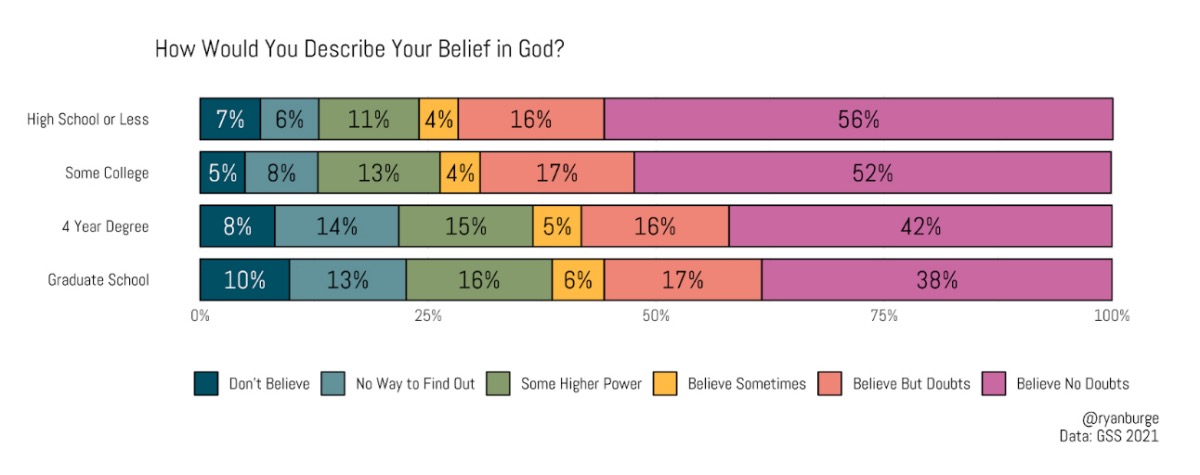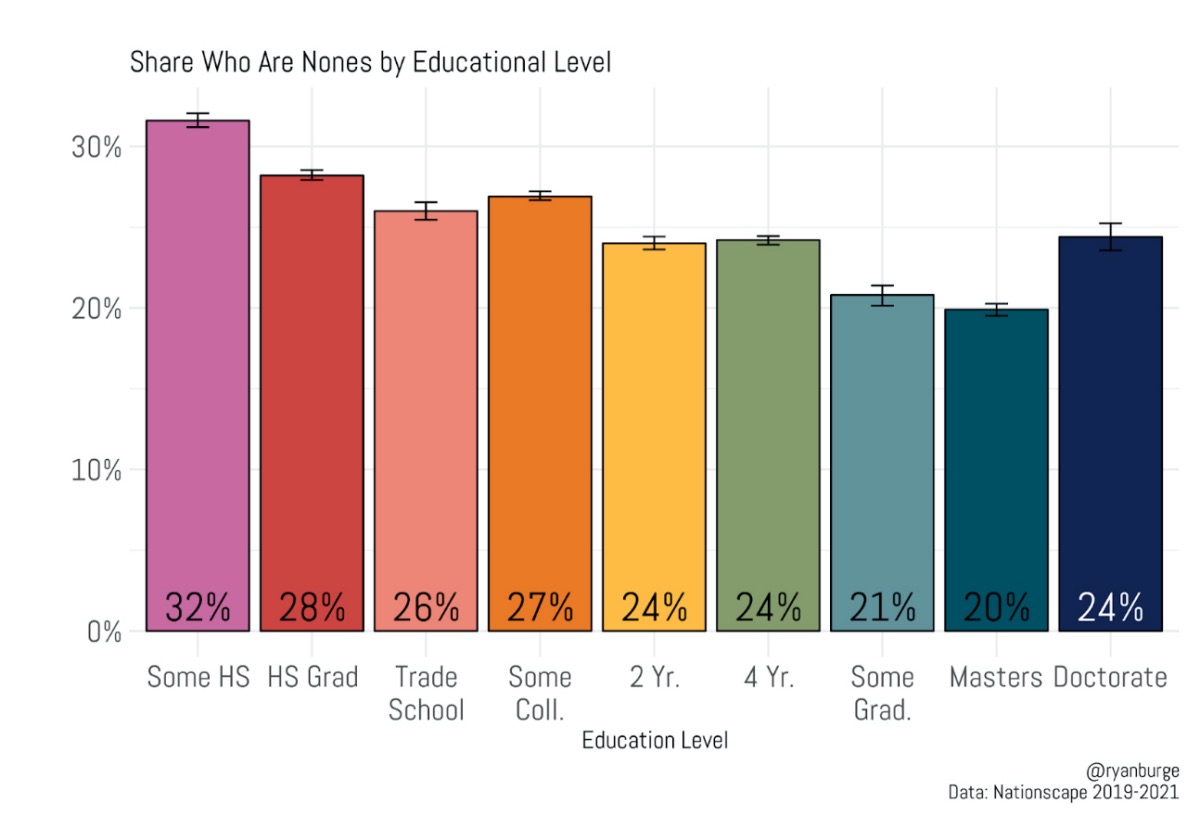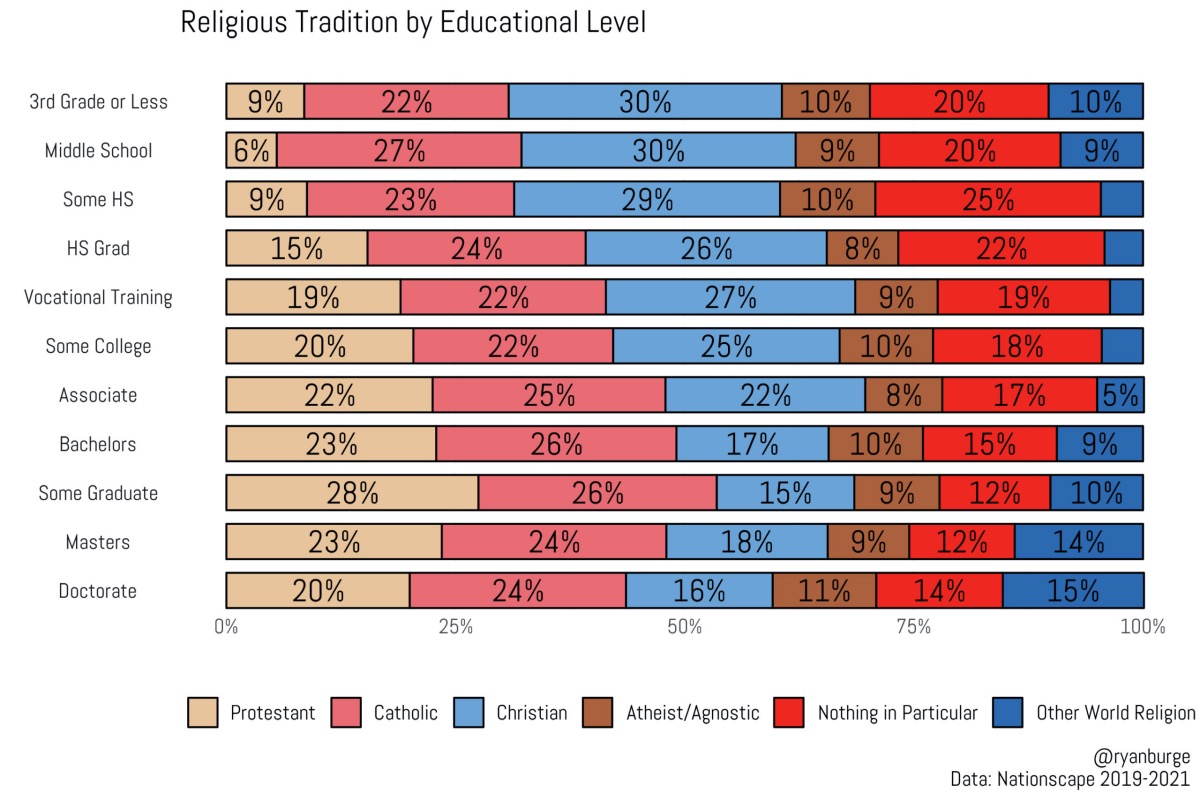
Despite a long-standing biased assumption among many that the uneducated cling to religion, RYAN BURGE, assistant professor of political science, pastor and author, says, in an article first published on Religion News Service, that studies show people with higher degrees are most likely to be religious…
United States
Via RNS
It’s been 30 years since The Washington Post published an article on Christian televangelists, describing their followers as “largely poor, uneducated and easy to command.” The pushback was immediate and overwhelming, as thousands flooded the Post’s telephone switchboard and letters poured in to its editors after Pat Robertson — a Yale Law School alum himself — read the offending passage on his television show, The 700 Club.
It was a watershed in journalism that woke many mainstream outlets to the reality of evangelicals’ demographics and power.
Yet the bias that says that churches, mosques and synagogues are filled with people who have a low level of education persists. The common assumption is that a formal education, particularly a college degree, is antithetical to religious belonging.

CHART: Ryan Burge
Even a cursory look at recent data reveals that just the opposite is true: Those who are the most likely to be religiously unaffiliated are those with the lowest levels of formal education. The group that is the most likely to align with a faith tradition? Those who have earned a college degree or more.
“Even a cursory look at recent data reveals that just the opposite is true: Those who are the most likely to be religiously unaffiliated are those with the lowest levels of formal education. The group that is the most likely to align with a faith tradition? Those who have earned a college degree or more.”
The Cooperative Election Study, one of the largest publicly available surveys in the United States, began in 2008. In all 14 years since, those Americans who attained no more than a high school diploma have been more likely to report no religious affiliation than college graduates. In 2020, 38 per cent of those who did not finish high school described their religion as atheist, agnostic or nothing in particular. For those who had completed some graduate school, just 32 per cent said that they were among those unaffiliated with any religious community, a group known as the nones.
We rely on our readers to fund Sight's work - become a financial supporter today!
For more information, head to our Subscriber's page.
This same finding holds true in larger and more granular data sets. The Nationscape survey has a total sample of more than 475,000 respondents and contains large numbers of individuals at every level of education, including nearly 9,000 respondents with a doctoral degree.
Being a none correlates most closely, at 32 per cent, with those who have not completed high school. About a quarter of people with a high school diploma or four years of college are nones, and among those with master’s degrees, only a fifth say they have no religious affiliation.

CHART: Ryan Burge
When the distribution of religious traditions is visualized by educational level, this relationship between these two factors becomes clearer. The share of respondents who identify as Christians (Protestant + Catholic + Just Christians) continues to rise, from 61 per cent for those with the lowest levels of education to 69 per cent of those who have taken some graduate courses.
It’s also noteworthy that the share of atheists and agnostics does not rise with educational levels, either. It’s eight per cent of those with a high school diploma and nine per cent of those with a master’s degree.
The relationship between educational attainment and religiosity takes a turn, however, when people are asked about the nature of their beliefs. Religion is not just a matter of identifying with a religious tradition, after all; it often involves an actual psychological belief in a higher power.
The General Social Survey asks individuals what they believe about God, offering a range of options, from “I don’t believe in God” to “I know God really exists and I have no doubts about it.” Among people with no more than a high school degree, 56 per cent indicated they were certain about their belief in God, while seven per cent said they didn’t believe in God at all. Those who hold graduate degrees were certain about their belief in God at a much lower rate of 38 per cent. The share who didn’t believe in God at all was 10 per cent.

CHART: Ryan Burge
Certainty about the existence of a higher power seems to wobble a bit, then, with higher educational attainment, despite an increased likelihood of being connected to a religious tradition. That finding was replicated in a recent study published in the American Sociological Review that concluded that education does seem to move individuals away from moral absolutism to moral relativism. This effect is stronger among those who major in the humanities, the arts, the social sciences or related fields.
We rely on our readers to fund Sight's work - become a financial supporter today!
For more information, head to our Subscriber's page.
This evidence seems to say that educated Americans are drawn to the communal aspects that religion provides, but may be more ready to question what’s coming from the pulpit. It’s not a surprising result, perhaps, given that higher education encourages discussion and debate – and perhaps, too, the urge to belong.

Ryan Burge is an assistant professor of political science at Eastern Illinois University, a pastor in the American Baptist Church and author of The Nones: Where They Came From, Who They Are, and Where They Are Going. He can be reached on Twitter at @ryanburge.
This article contains an affliate link.






